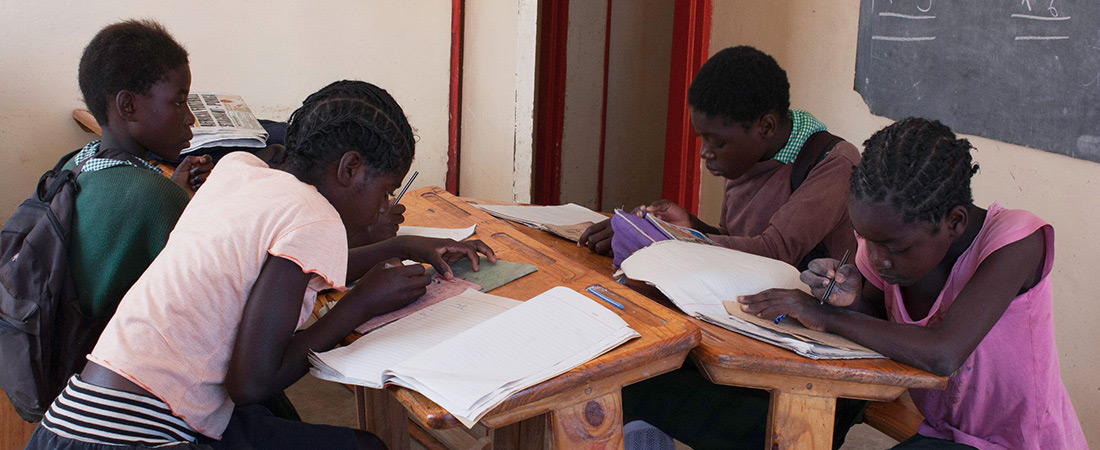Making Time to Learn

Zambia’s HIV/AIDS epidemic has orphaned hundreds of thousands of children—severely affecting their ability to stay in school. Primary methods of transmission are heterosexual sex and mother-to-child transmission. UNICEF estimates the following:
- More than 12 percent of the adult population is HIV positive.
- 1 million adults and children are living with HIV/AIDS.
- 460,000 women and 170 children are living with HIV.
- 680,000 children have been orphaned by AIDS.
Source: UNICEF Zambia Statistics 2011
Mercy used to get up before dawn and walk 25 miles to reach her primary school located in the Mkushi District, Central Province, Zambia. Her arduous trek through the bush meant crossing the Lunsemfwa River three times and risking encounters with a local gang. Once at school, she relied on friends and distant relatives for a place to stay, putting her at further risk for violence and sexual exploitation.
Mercy’s chances of staying in school were slim until she learned of a new scholarship program. Launched in 2012, the USAID Time to Learn project has provided scholarships to 9,000 students, including Mercy.
The scholarship covers uniforms, PTA fees, personal effects, school project levies to support improved academic instruction, and boarding fees, which means students such as Mercy can find safe lodging. Students also receive counseling, guidance, and support to help them stay in school and make healthy choices, including information about HIV/AIDS prevention.
“When [I learned] I would be one of the beneficiaries,” Mercy says, “I was able to sleep peacefully.”
By 2015, Time to Learn aims to provide 48,000 scholarships to Zambian orphaned and vulnerable girls and boys, enabling them to complete a grade 12 education. Funded by USAID and directed by EDC, Time to Learn works with the Ministry of Education, Science, Vocational Training and Early Education to support schools throughout the country. EDC partners with the Forum for African Women Educationalists in Zambia and the Campaign for Female Education to bring the program to schools like Mercy’s.
Lighting the way to learning
The Time to Learn scholarship program has produced significant benefits—helping students who are struggling within the existing Zambian education system to stay in school and learn.
Damascus tried to get an education, but his parents could barely afford food for the family. He dropped in and out of school, repeating grade 10. Determined to succeed, Damascus took on odd jobs around his school to raise money. Like Mercy, his village was many tens of miles from school, and he couldn’t go home to see his family often.
In spite of it all, Damascus was a good student, and head teacher Titus Hara, of the Mwavi Boarding High School in Luangwa District, Lusaka Province, noticed his efforts. Hara recommended Damascus for a Time to Learn scholarship so he could afford to stay in school.
Mwavi is not on the power grid, so Damascus studies with a paraffin lamp and candles. “Books became my bedmates,” he says. Academically, he is at the top of his class, and he hopes to attend the Zambia University of Natural Sciences.
Going the extra mile
Mercy’s and Damascus’ stories of walking many treacherous miles to school aren’t unique. Some rural communities start their own schools to avoid sending their children out on foot into the unknown.
EDC’s Patrick Fayaud explains. “Children in remote communities can’t access government or public schools that are 20 or 30 kilometers away. So parents and other volunteers start their own schools.”
But community schools have challenges. Teachers may lack formal training, are either paid little or not at all, and often don’t remain in their positions for very long. Student attendance and performance are low.
The Time to Learn project is working with the Zambian government to institutionalize support for community schools within the Ministry of Education, which will enhance learning opportunities and increase school effectiveness. With project support, the Zambia Ministry of Education has developed a new literacy curriculum and is training community school teachers to improve literacy instruction. Time to Learn also provides learning and teaching materials to schools, and helps school management committees mobilize parents around education, particularly reading.
“Our challenges are many,” Fayaud says. “We work with the most deprived schools and with unqualified teachers, but the Ministry of Education has made both improvement of reading performance and enhancement of community schools two of their priorities, and they have integrated Time to Learn into their plans and activities.”
For Damascus and Mercy, the journey to receive an education is not easy. But they are lighting the way for other Zambian youth to follow.